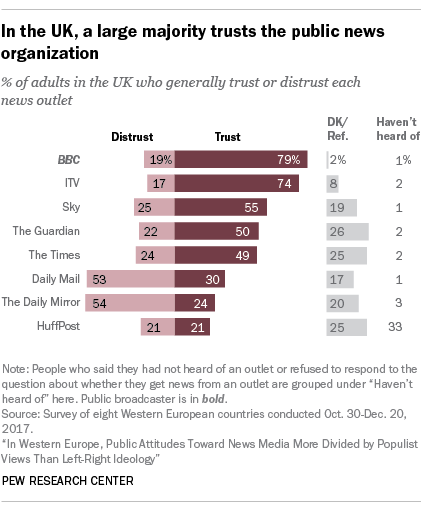
The Daily Mail is a UK-based tabloid news publication with a reputation for sensationalization and conservative bias. Regardless of this reputation, the company is massive with around 380 million website views each month. While the publication is often regarded as unreliable, 53% of adults in the UK distrust the publication according to Pew Research, how reliable, or in this case unreliable, is the Daily Mail really? To find out, we will examine a number of Daily Mail articles and opinion pieces as well as the company as a whole to determine its reliability.

Does Reliability Matter?
Reliability, in general, refers to how trustworthy or accurate information, or in this case, a news source is. If we consider this definition, it quickly becomes clear why reliability is important in media sources. If we can’t trust the things we read then there isn’t much of a point in continuing to consume content from that source, after all. So how exactly can we gauge the reliability of a news source anyways?
There are several potential measures of reliability to look out for when trying to determine whether a media source is reliable or not. Red flags for an unreliable article can include the presence of wild unsubstantiated claims, facts dependent on other unreliable sources, heavy use of opinionated language, and more. Some indicators of a reliable news source, on the other hand, include things like:
- Absence of subjective/opinionated language in articles
- Credible sources cited (e.g., neutral sources, .gov, .edu websites)
- Facts and statistics backed by multiple relevant outside sources
- Use of primary sources when possible (e.g., interviews, quotes)
- Information that remains consistent across news sources
How Does the Daily Mail Fare in its Reliability?
The political reliability index developed by Biasly objectively assesses news organizations’ accuracy and trustworthiness. Daily Mail’s overall Reliability Score has been rated as ‘Good’ by Biasly. This rating is a weighted average of two distinct scores: the Fact Analysis Score and the Source Analysis Score, each evaluating separate components of Daily Mail’s Reliability. When computing the Average Reliability of the article the Fact Analysis score is more heavily weighted. These ratings are as follows in the next two paragraphs:
Daily Mail’s Fact Analysis Score is ‘Good,’ which suggests readers can trust most of Daily Mail’s content online. The Fact Analysis score focuses more on the accuracy of claims, facts, and sources presented in the article and any hints of selection and omission bias, which we will discuss further in the article.
Daily Mail’s Source Analysis Score is ‘Fair,’ which suggests readers can trust some of the sources, links, and quotes provided by the news source. This score, which is based on A.I., focuses on assessing the quality of sources and quotes used including their number, lengths, uniqueness, and diversity.
However, since these scores are based on percentages and averages, individual articles could be more or less trustworthy depending on the context, author, and other factors. Our findings show that Daily Mail’s reliability is mostly but not all factual because they have retracted several stories in the past or had pieces that were not factual.
Let us analyze the supporting data for Daily Mail’s rankings and discuss what to watch out for while searching for trustworthy news sources.
Daily Mail Accuracy and Reliability
Bias has an undeniable impact on the accuracy and reliability of any particular news publication. As we have discussed in a previous article, the Daily Mail has a conservative bias, specifically towards the UK Conservative Party’s policies. To see how this bias affects the Daily Mail’s reliability, let’s take a look at some of their articles and analyze them for Omission and Selection bias.
Selection bias is when stories and facts are selected or deselected, often on ideological grounds, to create a narrative in support of the new sources’ ideology. Omission bias, on the other hand, is when different opinions and political views regarding a situation are left out so that the reader is only exposed to the ideological perspective supported by the author. It’s important to keep in mind these two types of biases when trying to assess an article’s level of accuracy.
Biasly’s accuracy rating system is based on a simple percentage scale with 1 percent being the least accurate and 100 being the most accurate. These ratings are determined by counting the average number of credible sources used by that publication in analyst-rated articles. As we mentioned earlier, the Daily Mail’s reliability analyst rating score on Biasly is “Good.”
As a general rule, articles with more bias score lower accuracy while articles with less bias score higher on the accuracy scale. Daily Mail articles analyzed by Biasly range from as high as “Excellent” to as low as “Fair.”
For our first example, let’s take a look at the Daily Mail article “Biden warns anyone on unemployment who is offered ‘suitable job’ MUST take it – after it was revealed workers on $32,000 salary before COVID now earn more in benefits.” The Analyst Bias score for this article is Medium Conservative. Similarly, the author’s bias was also rated as Medium Conservative. The Fact Analysis reliability score of this article is rated “Good”.
This article displays conservative bias through a number of criticisms of Joe Biden without presenting both sides. While the article does present quotes from business owners, it also cites a tweet by Missouri Republican Senator Josh Hawley criticizing Biden. This citation states that:
“Sen. Josh Hawley tweeted a clip of Biden announcing that people will lose their benefits if they reject suitable jobs, and wrote: ‘Turns out paying people more NOT to work isn’t such a great pro-work policy.’ ”
In addition, while citing business owners’ concerns with the issue is a solid source of how common people feel about the issue, there is no way to verify these business owners’ personal biases and how they might impact the quotations.
Analysis of Reliability in Daily Mail Opinion Pieces
While opinion pieces are simply intended to be the author’s viewpoint, they are a great way to understand the biases and reliability of a particular news publication. In the case of the Daily Mail, opinions are referred to as columnist articles, although they are functionally the same.
As an example, let’s take a quick look at the columnist piece “STEPHEN GLOVER: Imagine the mortification at the citadel of woke! But The Guardian wants to drag us all into its pit of shame.” The author of this piece criticizes the “woke” response of The Guardian, another British news publication, to its past ties to slavery. The author has a negative tone towards The Guardian’s donation of £10 million (around $12.8 million if you’re curious) as well as similar reparations from the Church of England and a BBC journalist in support of black communities in the UK, southern United States, and the Caribbean which had been impacted by the slave trade. The author likens the situation stating that in reference to German and Japanese atrocities in WWII:
“Do we demand reparations for these recent outrages, which necessarily cast a more vivid shadow over our times even than slavery and the slave trade, so much farther back in history? ”
While this might sound like a good point initially, this leaves out the fact that the German government did pay $86.8 billion in reparations to Holocaust victims and their descendants from 1945 to 2018 for the extermination of 6 million Jews. Whether or not the author is aware of this fact and whether or not these two situations compare equally, omitting this point is a possible example of selection and omission bias.
Quality of Sources and Facts Used
As an example of how well the Daily Mail columnists utilize sources and facts, let’s examine the piece “STEPHEN GLOVER: After Boris, Remainers will redouble their efforts to finagle us back into the eager embrace of Brussels…” This piece is a criticism of ‘Remainers,’ people who preferred that the United Kingdom remain in the European Union in contrast to Brexiteers. Although the UK left the EU in 2020, Brexit is still a controversial issue there with many still wanting to return to the EU. To back his beliefs on the issue, the columnist cites several solid sources, these being:
- The International Monetary Fund (IMF)
- The Office for National Statistics (UK government agency)
- The Bank of England
Using these sources, the author argues that the post-Brexit UK is not quite as terrible of a situation as many people believe. It also helps that the author admits that Brexit has not been perfect, stating:
“It’s not that I believe that Brexit has been a runaway success — one would have to be certifiable to think that. It’s just that I struggle to find any evidence that Brexit is the self-inflicted catastrophe many people claim. ”
Rather than trying to claim that Brexit is all good as that would be near impossible to prove, the author uses statistics to make the argument that Brexit, while imperfect, should not be reversed as it would not be worth the effort, and Boris Johnson was “triumphantly right about leaving the EU.”
Selection and Omission Bias
While the previously mentioned article does a good job of mentioning the opposing viewpoint’s beliefs and countering them, it does so to disprove them rather than accurately representing his opposition’s views. Although this usage of opposing arguments to strengthen his own is effective, it does somewhat rely on his audience sharing his pro-Brexit sentiments to some extent, relying on this agreement when asserting that the initial justification for Brexit, that is “to free us from bureaucracy and red tape so we would do better than EU countries, not merely keep up with them,” is definitively good.
While opinion pieces are, as the name would imply, the opinions of their authors, they are still representative of their publication. Because of this, the Daily Mail has the incentive to have conservative leaning-opinion pieces to attract their intended audience. The opinion piece we examined does a good job of including both sides’ views on the topic, it does so mainly to disprove viewpoints opposing his own rather than to really show both sides accurately. To do this, the author specifically selects information that can be easily disproven by other sources.
So is the Daily Mail Reliable?
While the Daily Mail’s bias certainly makes the publication somewhat less reliable, its nature as a tabloid news organization also impacts its reliability as it often focuses on sensationalization rather than truthful reporting. Overall, the combination of the Daily Mail’s bias and sensationalization makes it less reliable than many other publications. However, it’s always good to examine the reliability and bias of each individual article you read using Biasly’s Media Bias Checker.




























